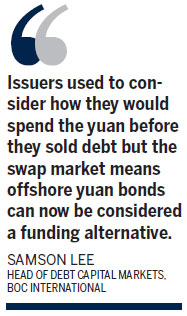Dim Sum sales by int'l issuers jump on swap boost
Updated: 2012-09-29 06:35
By Bloomberg(HK Edition)
|
|||||||||

Global issuers accounted for a record share of yuan-denominated bond sales in Hong Kong this quarter as it became more attractive to raise Chinese currency and swap the proceeds into dollars.
Export-Import Bank of Korea led 10.7 billion yuan ($1.69 billion) of Dim Sum offerings by non-Chinese companies, whose share of the market rose to 49 percent, excluding certificates of deposit, according to data compiled by Bloomberg. The securities yield an average 4.9 percent, down 66 basis points this year, Bank of America Merrill Lynch indexes show. Companies globally pay an average 2.8 percent to sell dollar debt.
Fading expectations for yuan appreciation have led to a shortage of the currency and plentiful supply of dollars, driving swap rates paid to get hold of renminbi to record highs.
That is opening the door for issuers to convert Dim Sum proceeds and use them outside of China. Since 2010, McDonald's Corp and Ford Motor Co sold the debt to fund operations inside China.
"We will see a more diversified range of issuers," said Samson Lee, the Hong Kong-based head of debt capital markets at BOC International, a unit of Bank of China Ltd, the second-largest arranger of Dim Sum debt excluding CDs. "Issuers used to consider how they would spend the yuan before they sold debt but the swap market means offshore yuan bonds can now be considered a funding alternative."
Dim Sum bond sales by international companies increased 34 percent this quarter from the previous three-month period, Bloomberg-compiled data show. At the same time, offerings by Chinese and Hong Kong-based businesses slumped 33 percent to 11.1 billion yuan.
The one-year offshore yuan cross-currency swap rate, the fixed cost paid to exchange dollars into the currency, rose to 2.8 percent last month from zero a year ago, reflecting increased appetite for obtaining renminbi outside of China. It remained near that high on Friday at 2.76 percent. The issuer swapping proceeds into dollars receives this rate and pays a floating rate linked to the London Interbank Offered Rate for the US currency.
German carmaker Bayerische Motoren Werke AG's Australian unit was one of the first issuers to swap yuan proceeds from Dim Sum bonds for cheaper funding, according to Frank Kwong, BNP Paribas SA's head of debt capital markets and syndicate for the Asia-Pacific region. BMW swapped the proceeds from a 400 million yuan one-year bond sold in November into Australian dollars, said Kwong, who worked on the deal.
(HK Edition 09/29/2012 page2)